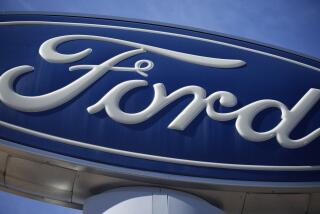Ford’s New-Car Pipeline Is Lagging, Analysts Say
- Share via
Ford Motor Co., top-heavy with gas-guzzling trucks, needs some new cars to help turn around the company’s fortunes but is running well behind its biggest competitors in developing them, industry analysts said Wednesday.
That assessment of Ford’s chief weakness comes after Japan’s Toyota Motor Corp. last month vaulted past Ford for the first time to take the second-place spot among U.S. auto retailers.
As if to underscore its problems, Dearborn, Mich.-based Ford on Wednesday announced that it had hired former Goldman Sachs Group Inc. investment banker Kenneth H.M. Leet to serve as strategic advisor.
The move comes after Chairman and Chief Executive William Clay Ford Jr. said last month that he would accelerate a restructuring plan that calls for cutting 30,000 jobs and closing 14 factories in North America by 2012.
Higher pension costs related to the job cuts forced the automaker to restate its second-quarter net loss late Wednesday to $254 million, or more than double the $123 million it reported last month.
Leet worked in Goldman Sachs’ London and New York offices for 18 years and most recently was head of European banking operations for Bank of America Corp.
The 48-year-old executive, who will report directly to CEO Ford, is expected to consider potential investment alliances with other companies and to focus on reviewing the automaker’s assets, in particular the moneylosing Jaguar subsidiary.
In its regulatory filing announcing the earnings restatement, Ford said it expected its Premier Auto Group, whose brands include Jaguar and Volvo, to post a loss this year based on recent sales trends.
For now, analysts are focusing on Ford’s product pipeline. Without up-to-date, competitive vehicles in dealers’ showrooms, they note, automakers cannot generate the cash needed to tackle their woes.
After more than a decade of success with its strong lineup of big pickup trucks and sport utility vehicles that once captivated buyers, Ford finds itself lagging behind the pack.
Soaring fuel prices have quickly altered the competitive landscape, and rivals such as Toyota, with broad lineups of fuel-efficient passenger cars, are seeing sales climb as truck-dependent manufacturers such as Ford and General Motors Corp. struggle.
“There’s no question that for a period of several years, except for the Focus and Mustang, our presence in the passenger car market was ‘missing in action’ and we just were not considered by car buyers,” said George Pipas, Ford’s sales and market analyst.
Instead of pushing cars, Ford rode high on a brilliant gamble that the way to win customers’ hearts in the 1990s would be with large pickup trucks and SUVs.
The Explorer, Expedition and Lincoln Navigator SUVs made bucketfuls of money for Ford; analysts say a full-size pickup or large SUV can easily bring the manufacturer $5,000 to $9,000 more profit than a passenger car.
Pipas said Ford had sensed a shift in the market and had passenger cars such as the Fusion sedan on the drawing boards in 2002, “long before gas prices became an issue.”
But he agrees with critics that Ford misjudged how quickly rising fuel prices would cut into truck sales.
“Ford has hits with the new Fusion sedan and the Mustang, but that’s about it on the passenger car side,” said Wes Brown, an auto industry analyst with consumer research firm Iceology in Los Angeles.
“They don’t have the consistency in the offerings to persuade consumers to always have them on the consideration list,” he said. “If you want a small car, you look at the Toyota Yaris or the Corolla, but Ford doesn’t have anything to compete. Its Focus compact is getting dated.”
Ford “is playing catch-up” to Toyota and other competitors with strong passenger car lineups, said Jeff Schuster, Troy, Mich.-based chief global forecaster for automotive market research firm J.D. Power & Associates in Westlake Village.
Still, Ford has introduced several new models, including the mid-size Fusion, Mercury Milan and Lincoln Zephyr sedans, the full-size Ford 500 sedan and the Freestyle “crossover” utility vehicle, which blends SUV and station wagon styling.
Crossovers use one-piece body and frame systems rather than separate truck-based steel rail frames and are expected to largely replace heavier and less fuel-efficient traditional SUVs.
All-wheel-drive versions of the new mid-size sedans are hitting showrooms this month and are expected to help spur sales of those already successful cars.
Indeed, after a decade of steady decline, Ford’s share of the U.S. passenger car market has slowly started to climb. The company, which sold 22% of the nation’s cars in 1994, had fallen to an 11.8% share at the end of 2003. Through July this year, though, Ford’s share is back up to 13.4%.
Nor is Ford abandoning the trucks that made it so successful in the ‘90s. Redesigned 2007 models of the full-sized Ford Expedition and Lincoln Navigator SUVs are due in September, and Super Duty pickups aimed at commercial users should hit the market early next year.
“We’re not trying to sell fewer trucks,” Pipas said. “We just want to get a better balance between trucks and passenger cars. That’s the key to growth.”






